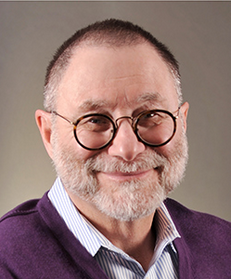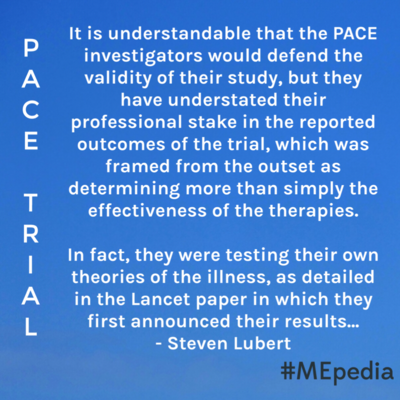Steven Lubet

Steven Lubet is the Williams Memorial Professor at Northwestern University Pritzker School of Law, where he specializes in professional responsibility and ethics. He has been living with Chronic Fatigue Syndrome (CFS) since 2006.
Debra Cassens Weiss wrote about Professor Lubet's CFS battle in ABA Journal: "Well-known law prof battles stigma of chronic fatigue syndrome by going public". Professor Lubet notes patients are "treated as malingerers and met with disbelief" with many "referred to psychiatrists" and that he 'outed' himself [about having ME/CFS] to broaden public understanding."[1]
PACE trial criticism[edit | edit source]

Mr. Lubet is a critic of the PACE trial and has written pieces deconstructing its faults.
Education[edit | edit source]
- JD, University of California, Berkeley
- BA, Northwestern University
Open letters[edit | edit source]
- 2017, Mr. Lubert was one of the signatories of open letter requesting the journal, Psychological Medicine, to retract their paper about the inflated recovery rates of the PACE trial immediately.[2]
Notable articles[edit | edit source]
Virology Blog
- July 3, 2017: "Trial by Error, Guest Post: Questions About Professor Sharpe’s ‘Special Ethics Seminar’"
- Apr 16, 2018: "Trial By Error, Guest Post: Crowdfunding David Tuller Is Not a Conflict of Interest"
Journal of Health Psychology
- March 7, 2017: "Investigator bias and the PACE trial"
Abstract - The PACE investigators reject Geraghty’s suggestion that the cognitive behavior therapy/graded exercise therapy trial could have been better left to researchers with no stake in the theories under study. The potential sources and standards for determining researcher bias are considered, concluding that the PACE investigators “impartiality might reasonably be questioned.”[3]
- June 14, 2017: "Defense of the PACE trial is based on argumentation fallacies"
Abstract - In defense of the PACE trial, Petrie and Weinman employ a series of misleading or fallacious argumentation techniques, including circularity, blaming the victim, bait and switch, non-sequitur, setting up a straw person, guilt by association, red herring, and the parade of horribles. These are described and explained.[4]
The Faculty Lounge
- Jan, 2015: "Laura Hillenbrand, Chronic Fatigue Syndrome, and me"
- Oct, 2015: "No, It Isn't All in Your Head"
- Nov, 2015: "ME/CFS and Law Schools"
- Aug, 2016: "An Appalling Episode in ME/CFS Research"
- Sep, 2016: "The PACE Study Results Exposed as Meaningless and Harmful"
- Nov, 2016: "An Open Letter to Dr. Simon Wessely, Defender of the PACE Study"
- Nov, 2016: "The PACE Study: Open Access and Conflicts of Interest" (UPDATED with a note to commenters)
- Nov, 2017: Turning the Corner on ME/CFS in the United Kingdom
- Jul, 2018: ME/CFS Patients vs. The Insurance Industry
- Jul, 2019: Do the Editors at BMJ Archives of Disease in Childhood Care about Conflicts of Interest? - on the SMILE trial
Learn more[edit | edit source]
See also[edit | edit source]
References[edit | edit source]
- ↑ "Well-known law prof battles stigma of chronic fatigue syndrome by going public". American Bar Association Journal. January 15, 2015.
- ↑ Lubet, Steven (March 13, 2017). "An open letter to psychological medicine about recovery and the PACE trial". Virology blog.
- ↑ Lubet, Steven (March 7, 2017). "Investigator bias and the PACE trial". Journal of Health Psychology. 22 (9): 1123–1127. doi:10.1177/1359105317697324.
- ↑ Lubet, Steven (June 14, 2017). "Defense of the PACE trial is based on argumentation fallacies". Journal of Health Psychology. doi:10.1177/1359105317712523.

